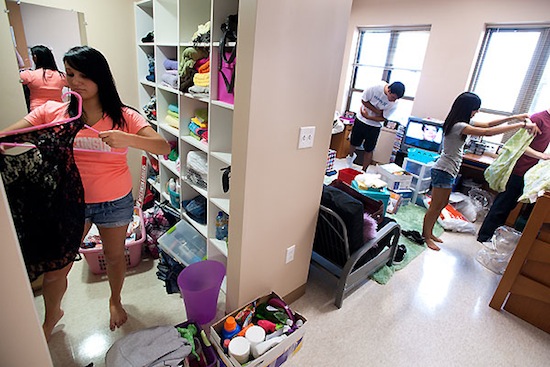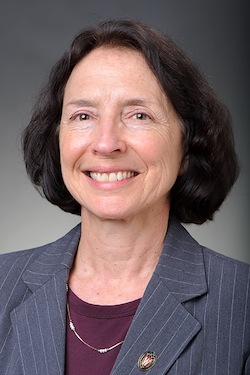Retiring Reuter-Krohn has seen many changes in University Housing

More than 30 fall move-in days have come and gone during the tenure of Kay Reuter-Krohn. Above, roommates move into Newell Smith Hall in 2010.
Photo: Jeff Miller
Kay Reuter-Krohn started at University Housing on July 7, 1982, as a live-in student affairs coordinator who supervised house fellows at Witte Hall.
Nearly 31 years later, Reuter-Krohn, now associate director of housing and director of residence life, has announced her retirement and is reflecting on a long career of helping thousands of students to navigate their way into independence and adulthood.

Reuter-Krohn
“I believe after all these years that living in a residence hall the first year is so important,” Reuter-Krohn says, “especially on a campus this size when you’re coming here from either very far away or small towns in Wisconsin. To come to this large campus, large city and feel that they have support, someone who cares and who can help them when they’re feeling lost or homesick, is essential.”
Reuter-Krohn has been on campuses, either going to school or working, since 1970. After graduating from UW–Platteville with a bachelor’s degree in psychology and sociology, she stayed on in a full-time position at the school while going to graduate school part-time. In 1979, she landed a job as a hall director at UW-La Crosse, and moved on to UW–Madison three years later.
“She has been instrumental in forming our reputation as an organization that cares about students, does things the right way, and accomplishes our objectives,” says University Housing director Paul Evans, who has worked with Reuter-Krohn since she started here.
Working with students and supporting their development and learning, she says, has always been her passion and working in the residence halls has been a perfect fit.
“The opportunity to support students who are here, working on their degree, starting to map out their career goals and what they want to do for the rest of their life, and how we help those students and the student staff be successful, is so critical,” she says.
During Reuter-Krohn’s tenure in housing, the residence halls went completely coed. The drinking age went from 18 to 19, then to 21 — a major culture change on campus.
The success of residential learning communities has been one of the most satisfying developments of her career, Reuter-Krohn says. The first two residential learning communities, established in 1995, helped connect living and learning through social, cultural and educational activities and opportunities. The residential learning communities also offer students the unique opportunity to interact with faculty in the residence halls. Next year, the ninth such community will kick off.
“I believe after all these years that living in a residence hall the first year is so important, especially on a campus this size when you’re coming here from either very far away or small towns in Wisconsin.”
Kay Reuter-Krohn
“For me that was the biggest transformation we were able to make in residence halls by bringing faculty, staff and students together to create living, learning communities outside the classroom that support academic success for our students,” she says.
“Having the opportunity to work with such excellent faculty and draw on their expertise to work so closely with students has been very gratifying,” Reuter-Krohn says.
One of the areas that has been and remains a constant focus for housing is diversity and ensuring that students feel safe, comfortable and welcome no matter what their background.
“In our communities we place a lot of emphasis on hiring a diverse staff, understanding that diversity is one of our core values in residence life, and training around diversity,” Reuter-Krohn says.
With the opening of a new residence hall, temporarily named the “New 32” (a permanent name will be selected by the fall) on the west end of campus this fall, the university will reach its longstanding goal of having enough space to accommodate every new student who chooses to live in University Housing.
“We’ve always had to turn away first-year students, international students and transfer students,” Reuter-Krohn says. “Those are the populations that most need our support when coming to campus.”
Reuter-Krohn’s last day is May 10. Evans says she will be missed, but she leaves a legacy that will benefit students for years to come.
“As a result of her quiet leadership and her never-wavering commitment to doing the right thing, so much has changed and so much has been accomplished,” he says.




